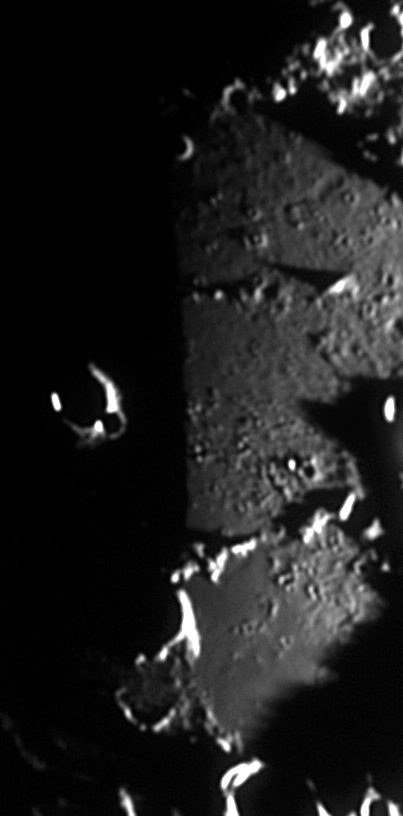
image by Jim Phillips
This may be the narrowest image that LPOD has posted but its a very informative one, suggesting something that I haven’t noted before. Jim has captured the terminator right on the Straight Wall. The straight line of shadow demonstrates that there is an abrupt decrease in surface elevation to the west (we knew that!), and the bright rim of Birt rises beautifully out of the still dark plain beyond. The low Sun picks out the ejecta from Thebit, and reveals more detail of the subtle rille-like depression at the northeastern end of the Straight Wall. But what immediately struck me is how much the line of hills that extend from Thebit to the southwest, and the smaller hills (including the peak Thebit Eta) between Birt and the rille, hint at an inner ring for the large ruined crater informally called Ancient Thebit. Ancient Thebit is about 200 km in diameter and could be a two-ring impact basin, with the inner ring about 75 km wide. At the southern end of the Straight Wall the putative circle of rim peaks extends just past the end of the Straight Wall, and one tiny peak is visible where the northern arc of hills extends across the Wall scarp. This proposed inner ring is as elusive as the posible one inside Deslandres. The Moon is unusual in not having (at least on the nearside) many of these small basins that are transitional to normal multi-ring basins. Both Mercury and Mars have quite a few. Why is the Moon different?
Technical Details:
March 26, 2007. TMB 8″ F/9 @ F/45 + Atik B&W webcam + K3Tools, Registax & Photoshop.
Related Links:
Rükl plate 54
Lunar Half Craters, Sky & Telescope, August, 2006.
A high Sun view
An Apollo view
Now you can support LPOD when you buy ANY book from Amazon thru LPOD
COMMENTS?
Register, and click on the Discussion tab at the top of the page.



